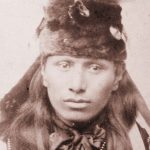Date of Birth: c. 1803
Zodiac Sign: Unknown
Date of Death: November 27, 1868
Biography
Black Kettle, also known as Mo’ōhtavetoo’o, was a prominent Cheyenne leader dedicated to peace and reconciliation between Native American tribes and the United States government during the tumultuous mid-19th century. Born around 1803 in the Black Hills of South Dakota, Black Kettle rose to prominence as a leader of the Southern Cheyenne. He is best remembered for his efforts to secure peace for his people amid increasing tensions and violence during the westward expansion of the United States. Despite his consistent advocacy for peace, Black Kettle witnessed and endured significant hardships, including the infamous Sand Creek Massacre in 1864, where a peaceful village of Cheyenne and Arapaho was attacked by the Colorado Territory militia. Black Kettle survived this attack, only to face continued violence and displacement. Tragically, Black Kettle was killed in the Battle of Washita River on November 27, 1868, in present-day Oklahoma, when U.S. Army troops led by Lt. Col. George Armstrong Custer attacked his encampment.
5 Interesting Facts about Black Kettle
1. Black Kettle was a signatory of the Treaty of Fort Wise in 1861, which ceded most Cheyenne lands to the U.S. government in hopes of securing peace.
2. He survived the Sand Creek Massacre, where over 150 Cheyenne and Arapaho women, children, and elderly were killed.
3. Black Kettle carried an American flag as a symbol of peace, believing it would protect his people from U.S. military attacks.
4. He consistently advocated for peace despite numerous provocations and attacks against his people.
5. His leadership and legacy are commemorated in various memorials and historical sites, including the Washita Battlefield National Historic Site.
5 Most Interesting Quotes from Black Kettle
1. “Although wrongs have been done to me, I live in hopes. I have not got two hearts… We want to take good tidings home to our people, that they may sleep in peace.”
2. “I once thought that I was the only man that persevered to be the friend of the white man, but since they have come and cleaned out our lodges, horses, and everything, it is hard for me to believe the white man anymore.”
3. “All we ask is that we may have peace with the whites. We want to hold you by the hand.”
4. “I am not a coward, and I do not want to fight. But we will defend our homes.”
5. “I will stand here until I die, if necessary, to secure peace for my people.”
Highest Net Worth Achieved
Being a Native American leader in the 19th century, Black Kettle did not accumulate personal wealth in the way it is measured today. His legacy is measured in his tireless advocacy for peace and the enduring memory of his leadership.
Children
Specific information about Black Kettle’s children is limited in historical records. It is known that he had a family, and his wife, Medicine Woman Later, was with him during the attacks on their camps.
Relevant Links
1. [Sand Creek Massacre National Historic Site](https://www.nps.gov/sand/index.htm
2. [Washita Battlefield National Historic Site](https://www.nps.gov/waba/index.htm
4. [Black Kettle on Britannica](https://www.britannica.com/biography/Black-Kettle
5. [Cheyenne Peace Chief: Black Kettle](https://www.legendsofamerica.com/na-blackkettle/

